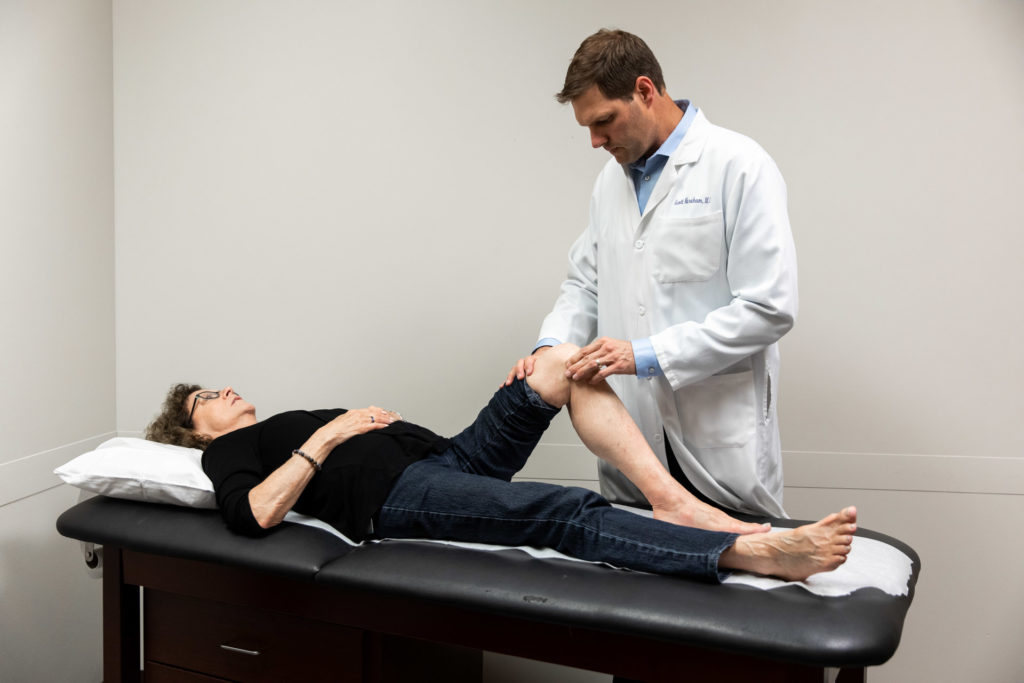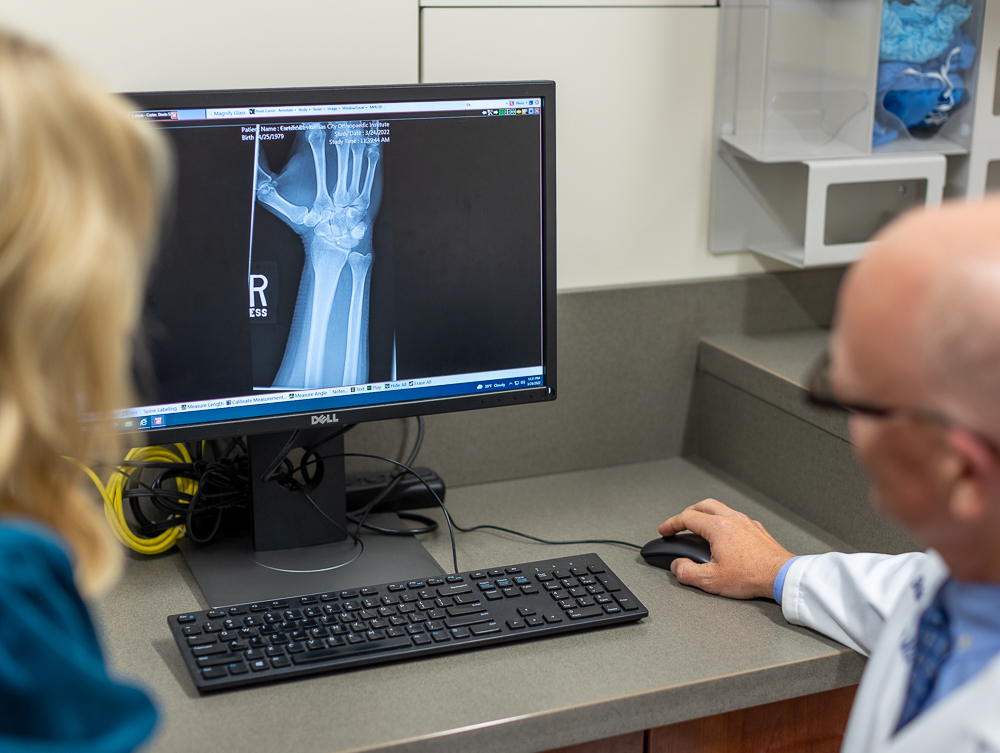
Keep reading to learn about meniscus tears, your treatment options, and when meniscus surgery is necessary. If you’re ready to treat your knee pain right now, skip ahead and request an appointment with a knee doctor in Kansas City.
Whether you’re on the football field or doing chores around the house, a single misstep, twist, or fall can result in a painful knee injury. Knee pain is one of the most common reasons people seek orthopedic treatment, accounting for 4 million annual visits.
Finding an experienced knee injury specialist is critical if you have persistent knee pain. Knee injuries that go untreated can worsen over time, leading to long-term problems that can significantly impact your participation in daily activities.
Kansas City Orthopedic Alliance is the Midwest’s premier provider of orthopedic care. As the largest orthopedic practice in Kansas City, we treat thousands of knee injuries each year across our 5 locations—Overland Park, Leawood, Belton, Kansas City, and Blue Springs. Using the latest technology, our experienced providers can evaluate, diagnose, and treat nearly any type of musculoskeletal injury.
In this blog, we’ll discuss one of the most common types of knee injuries—meniscus tears.
What is a meniscus tear?
Three bones make up your knee joint—the femur (thigh bone), the tibia (shin bone), and the patella (knee cap). Between the femur and tibia are two cartilage pads that act as cushions, called the menisci (one is called a meniscus).
The menisci prevent your bones from rubbing against each other. However, this cartilage is susceptible to injury and can cause severe pain when damaged.
How do meniscus tears happen?
In young people, a torn meniscus is often the result of forcefully twisting or rotating the knee. These movements are common in sports, putting athletes at high risk for meniscus injuries (especially those who play contact sports). Football players have the highest rate of meniscal injuries compared to other athletes.
However, you don’t have to be an elite athlete to tear your meniscus. As part of the natural aging process, our cartilage becomes thinner and less resilient over time. As a result, our menisci become more vulnerable to injury. This can result in everyday activities causing a tear, (such as squatting or lifting something heavy).
What are the signs of a meniscus injury?
Some of the most common symptoms we see with meniscus tears include:
- Pain in the knee joint
- Swelling
- Stiffness
- A catching or locking sensation when moving your knee
- Inability to fully straighten your knee
- Limping
- A popping sensation
If you have a meniscus injury, contact KCOA to connect with a provider for meniscus injury management in Kansas City.
How are meniscus injuries diagnosed?
Although meniscus tears are among the most common knee injuries, other acute injuries and chronic conditions can also cause knee pain. The first step to understanding the cause of your knee pain is through a comprehensive assessment.
Assessment
At KCOA, we take a patient-centered approach to orthopedic care. Your initial appointment will start with an assessment to learn more about you, your medical history, and your injury. We’ll ask questions to inform further evaluation and treatment, such as:
- Does your pain limit your activities?
- Has your pain worsened over time?
- What did it feel like when the injury occurred? Did you hear a popping sound?
- Have you noticed any changes in your symptoms?
- What are your lifestyle goals?
- How is your knee pain affecting those goals?
Physical exam
After learning more about your medical history, your doctor will conduct a physical exam. This involves moving your leg in different positions to test your range of motion and determine what might be causing your pain.
Our physicians will use the information from your assessment, medical history, and physical exam to determine the next course of action. If your symptoms warrant further assessment, we will use imaging to ensure a correct diagnosis.
Imaging
KCOA offers a comprehensive approach to care with in-clinic advanced diagnostic testing. If you need an MRI or digital X-ray, you don’t have to wait days or weeks to get into an imaging center. Our efficient imaging specialists will take X-rays as part of your office visit and/or help schedule you for a timely MRI appointment. Our team will assist with the insurance authorization process to help get your MRI approved by your insurance company as well.

X-Ray
Your physician might start with an X-ray to examine the soft tissue and bone around your knee joint. X-rays can help determine if any of the following might be causing your pain:
- A fracture (also known as a “broken bone”)
- Joint dislocation
- Sprain
- Osteoarthritis
- Bone infections
- Other bone conditions
X-rays do not show cartilage, so meniscus tears are not diagnosed from X-rays alone. If the X-ray does not suggest any of the above conditions, your doctor may recommend an MRI as the next step.
MRI
MRI uses magnetic fields that allow doctors to visualize almost every internal structure in the human body. An MRI will show if you have a tear in your meniscus, where the tear is, and the severity of the tear. Using this information, your doctor can determine the most effective treatment option for you.
What are my treatment options?
We make sure patients are fully informed about their treatment options. In most cases, we start with conservative treatments, exhausting all non-surgical options before recommending meniscus surgery in Kansas City.
Effective non-surgical treatments can include:
Physical therapy
When you have knee pain, your first instinct might be to restrict movement. However, movement can actually reduce pain and promote healing when done correctly. A physical therapist can guide you through strengthening and flexibility exercises to improve joint mobility and function.
We know many great physical therapists throughout the Kansas City area. Our doctors provide PT protocols and can recommend a physical therapist near you.
Medications
Your orthopedic doctor may prescribe or recommend over-the-counter medications to reduce inflammation and pain. It’s always important to discuss medications with your provider before starting something new, even if it’s over-the-counter.
Stabilization
Your knee doctor may recommend braces to provide extra support and stability to your knee if necessary. This takes some of the stress off the meniscus and allows it time to heal.
Other non-surgical treatments
In many cases, if your meniscus tear is mild and not causing too much pain, meniscus surgery is not necessary. Mild meniscus injuries usually heal on their own with the following supports:
- Rest
- Ice
- Compression
- Elevation
- Nonsteroidal anti-inflammatory medications (such as Ibuprofen)
Meniscus surgery may be necessary if conservative approaches provide little or no relief for your pain.
Meniscus surgery in Kansas City
Your doctor may discuss surgical options if your injury is severe or when non-surgical treatments don’t help. Our board-certified orthopedic surgeons perform three types of meniscus surgeries:
1. Meniscus repair
In this procedure, surgeons sew the torn pieces of cartilage together to help the meniscus heal on its own. Meniscus repair is only effective when there is adequate blood supply to support cartilage repair. Blood supply is dependent on factors such as your age, the type of tear, and the location of the tear.
When possible, physicians prefer meniscus repair over other surgical options because it preserves the entire meniscus. However, not all tears can heal with this procedure. Your doctor will determine if you’re a good candidate for this procedure based on your specific injury.
Meniscus repair has a longer recovery time because the meniscus needs time to heal itself. Braces are typically worn for 4 to 6 weeks after surgery, followed by 6 to 8 weeks of physical therapy. Full recovery takes about 4 months.
2. Meniscus debridement
This is the most common type of meniscus surgery. The surgeon removes the injured cartilage in this procedure, leaving a smaller (but healthy) meniscus intact. Removing this damaged cartilage will usually alleviate your pain.
The recovery time after meniscus debridement is shorter compared to meniscus repair. After a few days on crutches, patients can return to daily activities within a week. Most patients can return to sports between 1 to 2 months.
3. Meniscus transplantation
If the meniscus is severely damaged, meniscus transplantation might be your best option. In this procedure, your surgeon removes the entire meniscus and replaces it with donor cartilage.
Recovery usually involves 4 to 6 weeks on crutches, followed by a physical therapy program to rebuild your strength. Sometimes, it will be 6 to 12 months before we recommend patients return to sports.
KCOA is here to help you get back to the activities you love. Start the process right now with our virtual consultation tool.
Contact KCOA to learn more about meniscus surgery in Kansas City

You shouldn’t take risks when it comes to your knees. Knees are critical to your mobility and function, so seeking advice from a qualified physician is always recommended.
At Kansas City Orthopedic Alliance, we’re dedicated to creating a superior patient experience for all. If you’re considering meniscus surgery in Kansas City, our team will work with you to ensure the best possible outcomes. We’ve helped thousands of patients treat their pain, restore their function, and increase their quality of life.
Scheduling an appointment with one of our providers allows us to find the best treatment option for your needs. In addition, we can pinpoint the underlying issue of your knee pain using the most advanced technology.
For a thorough evaluation, call us at (913) 319-7600 or schedule an appointment today. If you’re struggling with knee pain but don’t know where to start, use our symptom tracker for treatment recommendations.


